Bank statements are an essential tool for tracking your financial health. They provide a record of all the transactions that have taken place in your bank account, making it easy for you to monitor your spending, budgeting, and saving. In this blog, we’ll delve into the world of bank statements and explore all the valuable information they contain.
What is a Bank Statement?
A bank statement is a document that summarizes all the financial transactions in a bank account over a specified period of time. This document is usually produced monthly and contains details such as deposit and withdrawal amounts, the date of transactions, and the names of the payees and payers. Bank statements also provide information on any charges or fees that have been applied to your account, including overdraft fees and account maintenance fees.
Types of Bank Statements
There are two main types of bank statements: electronic and paper statements. Electronic statements are delivered to your email, online banking account, or mobile device, and they are available for download or printing. Paper statements are mailed to you and contain the same information as electronic statements.
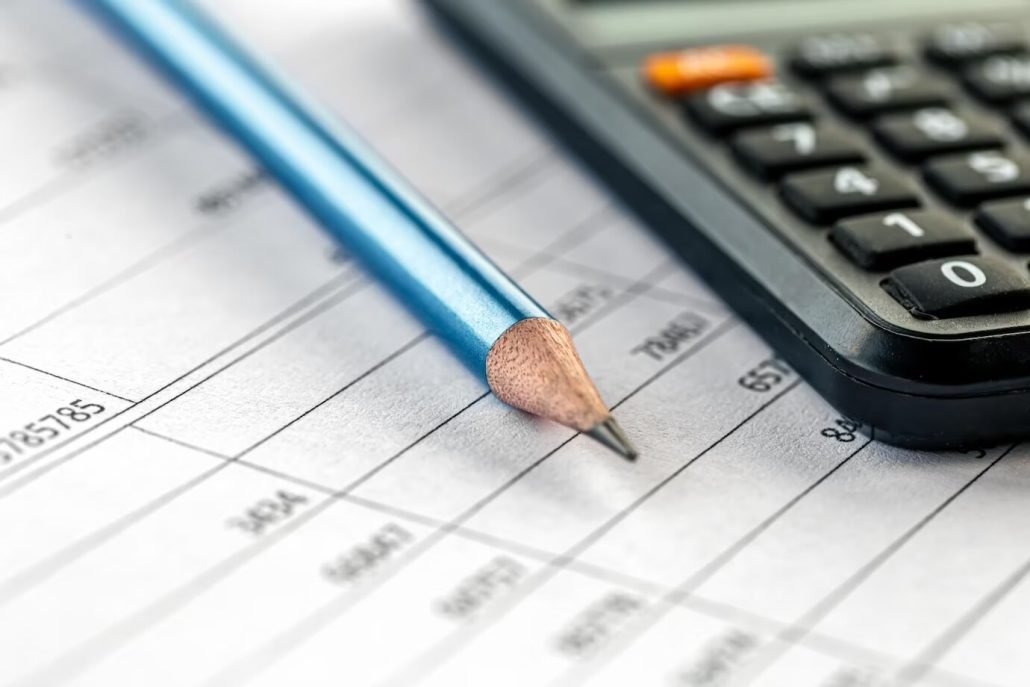
Benefits of Reviewing Your Bank Statements
➤ Improved Financial Management: By reviewing your bank statements regularly, you can stay on top of your finances and ensure that your account is in good standing. This helps you track your spending, identify areas where you can reduce expenses, and plan your budget more effectively.
➤ Early Detection of Fraud: Regularly checking your bank statements can help you detect any fraudulent activities early on. This is because bank statements provide a complete record of all transactions, allowing you to identify any unauthorized transactions and report them to your bank.
➤ Monitoring Account Activity: Bank statements also provide information on account activity, such as deposit and withdrawal amounts, and the names of the payees and payers. This information is useful for tracking your spending patterns and identifying areas where you may need to cut back on expenses.
➤ Proof of Transactions: Bank statements can also serve as proof of transactions for tax purposes, loan applications, and other financial matters. They provide a clear record of your financial activities, making it easier for you to make informed decisions about your finances.
In conclusion, bank statements are an essential tool for managing your finances. They provide a comprehensive record of all financial transactions and are an excellent resource for tracking your spending, budgeting, and saving. By reviewing your bank statements regularly, you can stay on top of your finances, detect fraud, monitor account activity, and have proof of transactions when you need it.
We have a large collection of bank statements available for banks around the world. Click here to see them: bank statements

 for any PSD file modification pay $20 (customize)
for any PSD file modification pay $20 (customize) 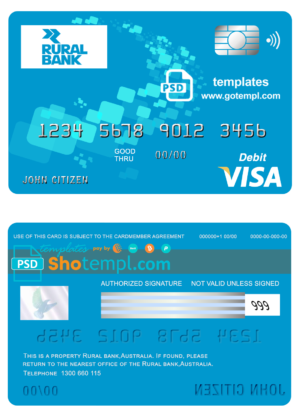 Australia Rural Bank visa card debit card template in PSD format, fully editable
Australia Rural Bank visa card debit card template in PSD format, fully editable  a developing guide to make a super fast screenshots
a developing guide to make a super fast screenshots 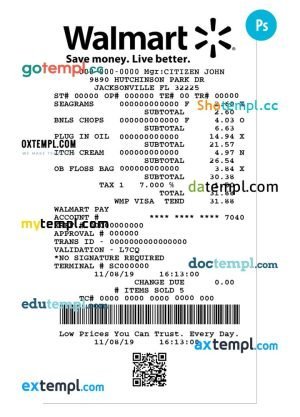 Walmart payment check PSD template
Walmart payment check PSD template  Skrill Mastercard Debit card template in PSD format, fully editable
Skrill Mastercard Debit card template in PSD format, fully editable 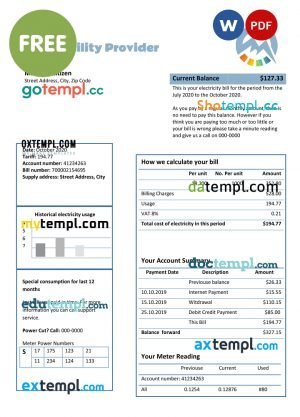 cycle energy universal multipurpose utility bill template in Word format
cycle energy universal multipurpose utility bill template in Word format 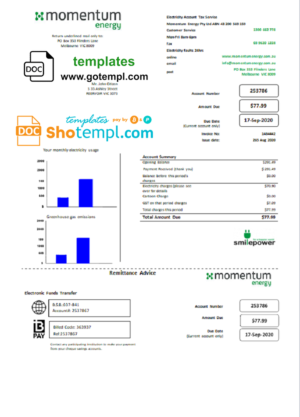 Australia Momentum Energy utility bill template in Word and PDF format
Australia Momentum Energy utility bill template in Word and PDF format 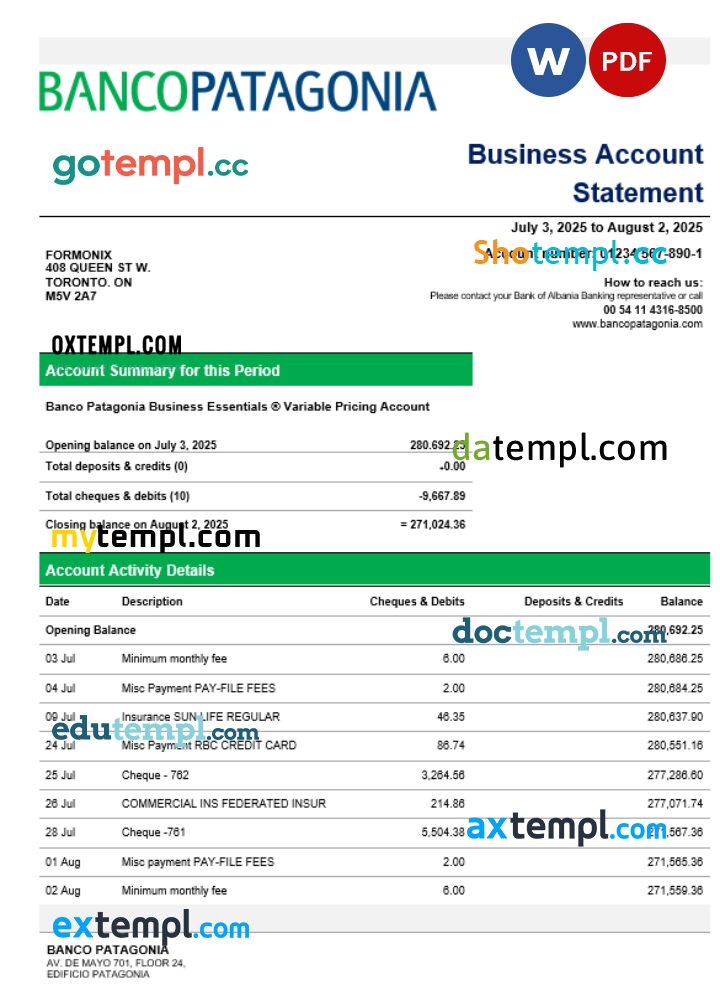 Banco Patagonia business bank statement Word and PDF format
Banco Patagonia business bank statement Word and PDF format 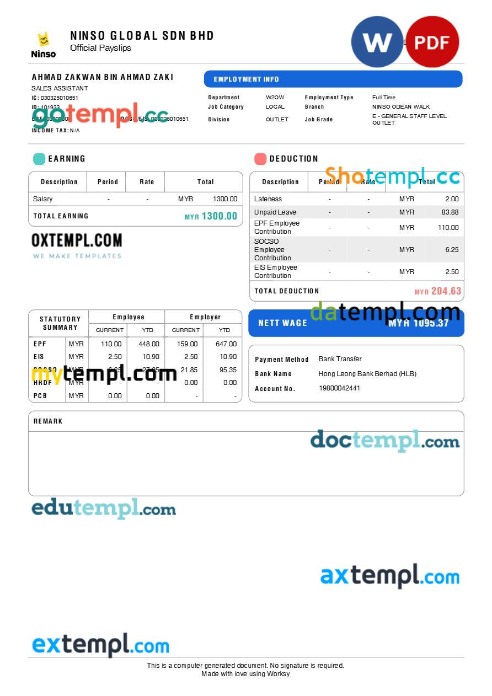 Ninso Global Sdn. Bhd. payslip template in Word and PDF formats
Ninso Global Sdn. Bhd. payslip template in Word and PDF formats 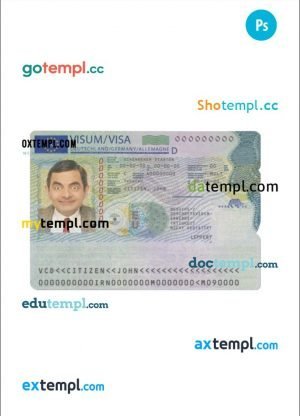 Germany Schengen visa template in PSD format, 2 PSD files fully editable, 2018 - present
Germany Schengen visa template in PSD format, 2 PSD files fully editable, 2018 - present 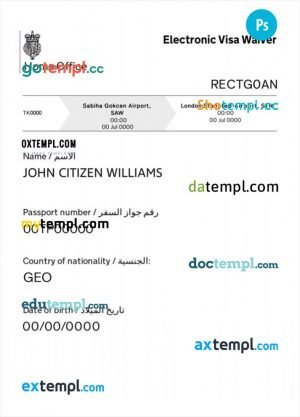 United Kingdom electronic visa waiver PSD template, fully editable
United Kingdom electronic visa waiver PSD template, fully editable 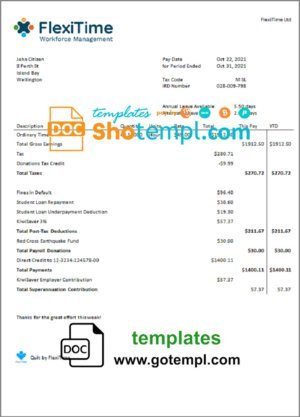 USA FlexiTime workforce management & payroll solutions invoice template in Word and PDF format, fully editable
USA FlexiTime workforce management & payroll solutions invoice template in Word and PDF format, fully editable  baloon bio universal multipurpose bank visa electron credit card template in PSD format, fully editable
baloon bio universal multipurpose bank visa electron credit card template in PSD format, fully editable 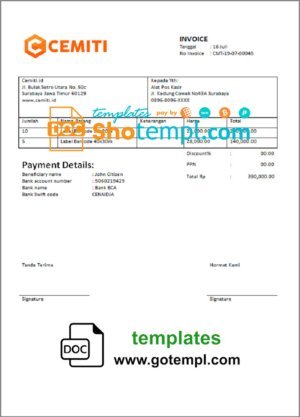 India Cemiti sports electronic community invoice template in Word and PDF format, fully editable
India Cemiti sports electronic community invoice template in Word and PDF format, fully editable 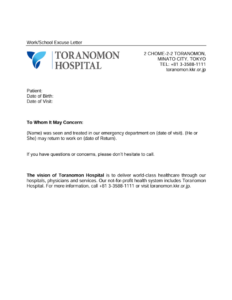 Toranomon Hospital excuse letter template in Word and PDF formats
Toranomon Hospital excuse letter template in Word and PDF formats 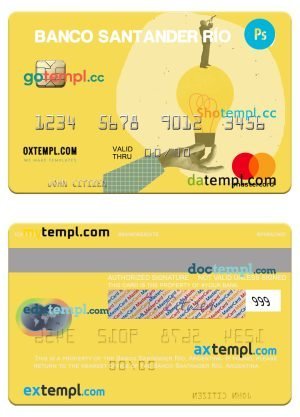 Argentina Banco Santander Río mastercard template in PSD format
Argentina Banco Santander Río mastercard template in PSD format 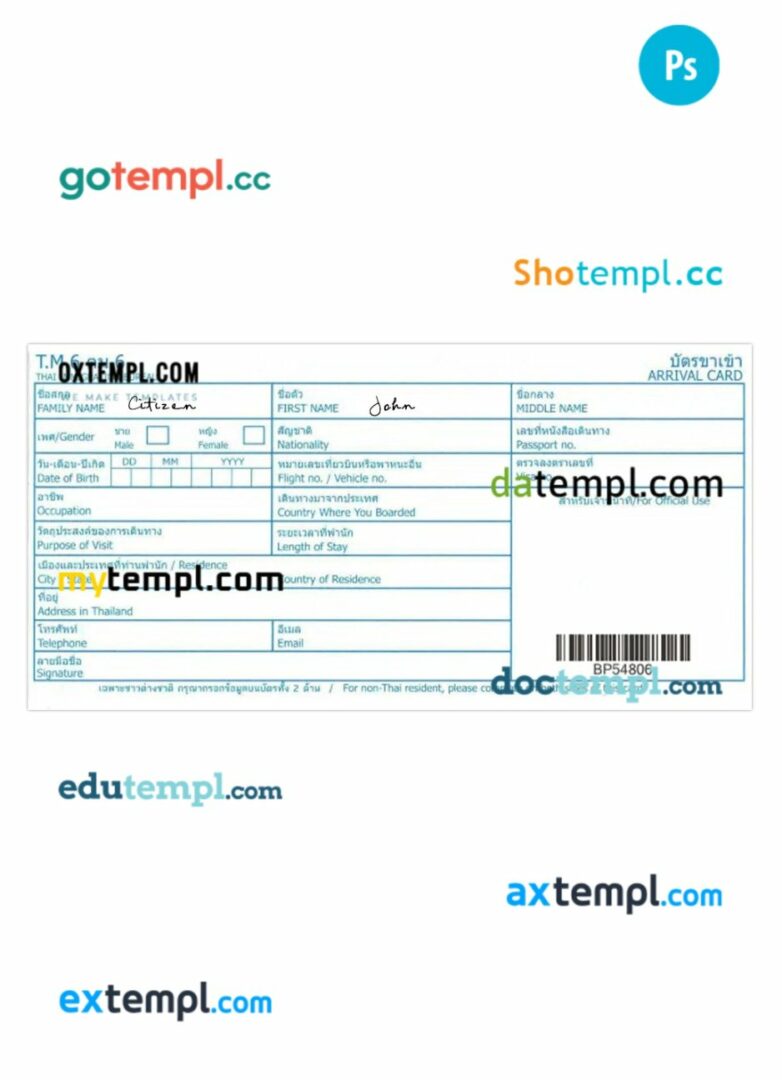 Thailand arrival card template in PSD format
Thailand arrival card template in PSD format  Modern CV Template in WORD format
Modern CV Template in WORD format 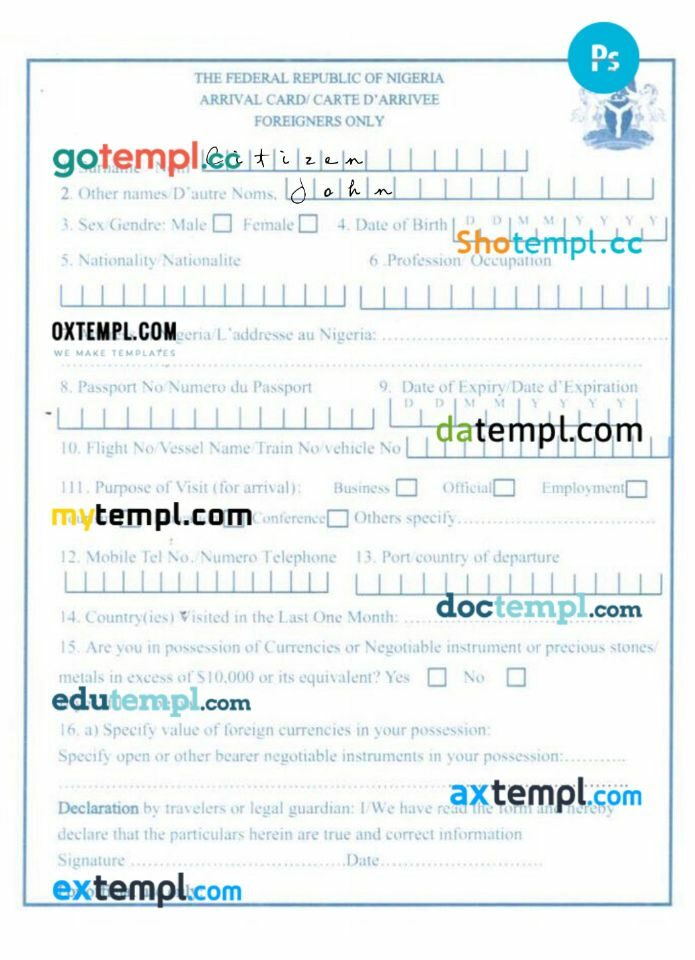 Nigeria arrival card foreigners only template in PSD format
Nigeria arrival card foreigners only template in PSD format  Australia New South Wales decorative (commemorative) birth certificate template in PSD format, fully editable
Australia New South Wales decorative (commemorative) birth certificate template in PSD format, fully editable  Australia Queensland decorative (commemorative) birth certificate template in PSD format, fully editable
Australia Queensland decorative (commemorative) birth certificate template in PSD format, fully editable 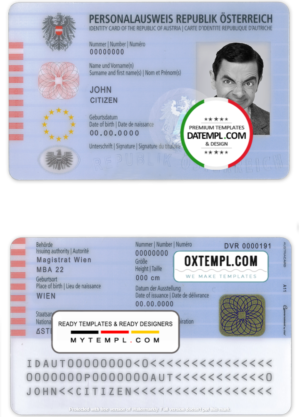 Austria ID template in PSD format, fully editable, with all fonts
Austria ID template in PSD format, fully editable, with all fonts 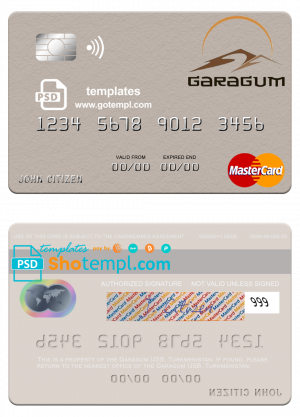 Turkmenistan Garagum IJSB mastercard template in PSD format
Turkmenistan Garagum IJSB mastercard template in PSD format